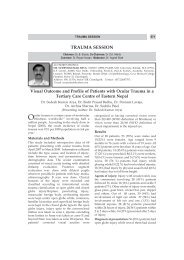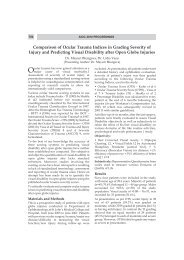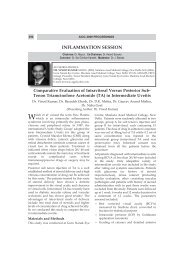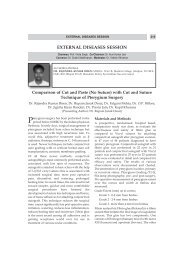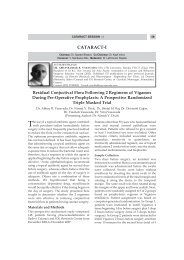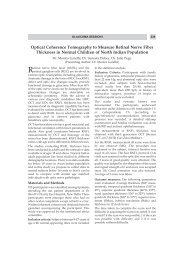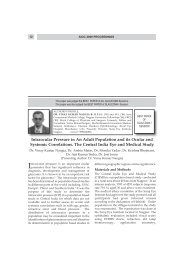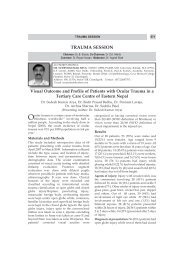Cornea - I Free Papers - aioseducation
Cornea - I Free Papers - aioseducation
Cornea - I Free Papers - aioseducation
You also want an ePaper? Increase the reach of your titles
YUMPU automatically turns print PDFs into web optimized ePapers that Google loves.
<strong>Cornea</strong> <strong>Free</strong> <strong>Papers</strong><br />
To Study The Effect of Sub-conjunctival Injection<br />
of Bevacizumab on <strong>Cornea</strong>l Neovascularisation<br />
Dr. Somnath Mukhopadhyay, Dr. Himadri Dutta, Dr. Jayanta Dutta,<br />
Dr. Swarnali Sen, Dr. Pradeep Kumar Panigrahi<br />
Neovascularization is a severe complication of ischemic retinal diseases<br />
such as diabetic retinopathy, branch and central retinal vein occlusion,<br />
and retinopathy of prematurity. However, in various inflammatory corneal<br />
diseases, corneal neovascularization may also occur, particularly in the<br />
chronic course of the disease. The consequences of corneal neovascularization<br />
may not only be a severe reduction of visual acuity but also a worse prognosis<br />
for corneal transplantation because of loss of the immunologic privilege of the<br />
avascular cornea.<br />
However, the pathogenesis of corneal angiogenesis has not yet been fully<br />
defined, and the identity and significance of different angiogenic growth factors<br />
are debatable. Several studies have shown that vascular endothelialgrowth<br />
factor (VEGF), which was identified about 1 decade ago, plays a major role in<br />
vasculogenesis and in pathologic neovascularization. This protein stimulates<br />
angiogenesis in a noninflammatory model of neovascularization in the<br />
mouse cornea and was recently identified as a functional endogenous corneal<br />
angiogenic factor required for inflammatory neovascularization in a rat model.<br />
Bevacizumab is a humanized monoclonal antibody to VEGF designed for<br />
intravenous administration and approved for the treatment of colorectal<br />
Bevacizumab is currently injected into the vitreous for the treatment of<br />
proliferative and nonproliferative diabetic retinopathy, agerelated macular<br />
degeneration, and neovascular glaucoma, with successful outcomes and rapid<br />
regression of the pathologic blood vessels.<br />
We report here on our experience with subconjunctival injections of<br />
bevacizumab for corneal neovascularization in human subjects.<br />
MATERIALS AND METHODS<br />
The study group consisted of 10 adults (4 men and 6 women) 32–89 years of<br />
age with vascularized cornea , secondary to post DALK interface opacity(n=5),<br />
contact lens users (n=3), and chemical burn (n=2).<br />
All had extensive superficial and deep vascularization of the cornea and<br />
had a failure of steroid drops trial (4 times daily) for the treatment of these<br />
pathologic vessels. The study was approved by the Institutional Research<br />
Ethics Committee and informed consent was obtained before the procedure.<br />
Eyes were anesthetized with topical proparacaine hydrochloride drops.<br />
493






